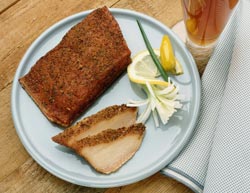Protein
 |
While carbohydrates are a staple for the athlete, protein is also required to perform your best. Protein plays an important role in the growth, repair, and maintenance of muscle tissues. Protein is needed to form hemoglobin, the substance that carries oxygen to exercising muscles. In prolonged activity, protein can also supply fuel for energy. Your protein intake can make up fifteen to twenty percent of your daily energy intake, which should be in the range of 0.5g – 1.0g / lb. in a growing teenage athlete, depending on the level of activity.
Protein needs are easily obtained in the United States. As a matter of fact, most people tend to overeat protein. Lean meats, poultry, fish, and eggs are the most concentrated source of protein. Many of these animal proteins are also good sources of iron and zinc. High quality plant sources of protein include tofu, beans, lentils, and some grains like quinoa. Having a meal of cereal and milk in the morning, a snack with almond butter, lunch with lean meat like turkey, and a tofu stir-fry for dinner, in combination with other dairy and whole grains is an example approach to meeting your protein needs.